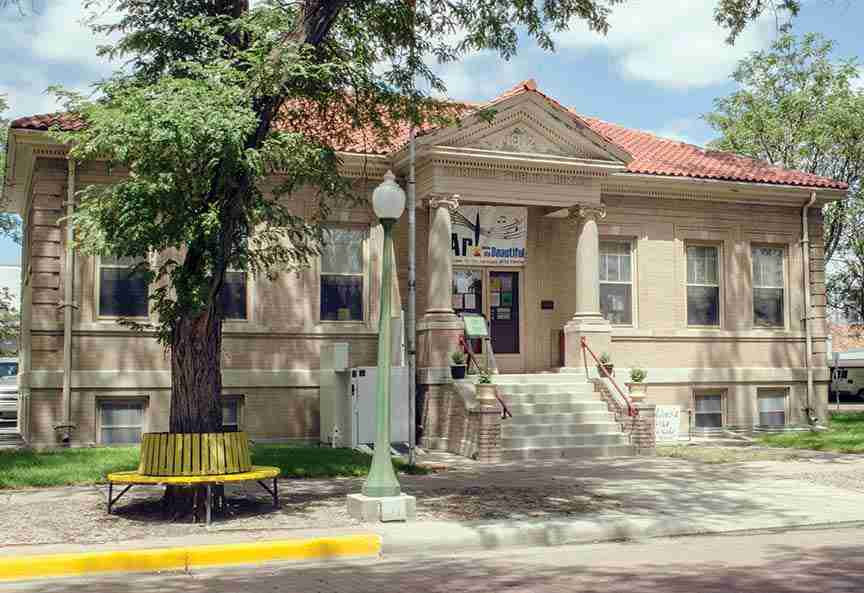Goodland shows the way for women’s voting rights
The fight for women’s voting rights in Kansas was a slow process. The march to equal voting rights lasted from 1861 to 1920, with many halts along the way. Goodland helped show the way when its citizens — including women — voted for a library tax in 1909.
In 1861, Kansas women had gained the right to vote for school board candidates. Voting in municipal elections required another 26 years, until 1887. Then the process stalled again.
Enter the Endeavor Club, the city attorney, and a steel magnate.

Goodland needs a library
In July 1908, the girls of the Christian Church’s Christian Endeavor Club decided that Goodland needed a library. Then a civic-minded business owner stepped up. Hodgkinson’s Store at 10th and Main provided free library space. However, Hodgkinson’s could only be a temporary solution.
Goodland needed a dedicated library building. To make a library building a reality, women’s groups banded together. They sold library memberships. They held fundraisers.

Steel magnate is Goodland’s best hope for library funds
Steel magnate Andrew Carnegie was Goodland’s greatest hope for a library building. Carnegie, one of the world’s richest men, had begun giving away his fortune. Much of his philanthropy was directed toward building libraries. By the end of his life, he had established 1,678 of them. In an official letter, Goodland Mayor P.J. McBride asked Carnegie to donate a library and Carnegie responded favorably. He granted $10,000, which is $284,328.26 in 2021 dollars.
But the grant came with a condition. The City had to furnish $1,000 a year to maintain the library. Carnegie’s condition required the City to call a special election.
The City calls a special election; could women vote?
In order to receive Carnegie’s grant, Goodland citizens needed to support the library with a tax. The citizens who wanted a library gathered signatures. The City scheduled the election for Jan. 29, 1909.
Many women had worked hard for a library. But could they vote? Special elections fell into a gray area. Did a special election qualify as a municipal election or not?
Library election opens door for women’s voting rights
To settle the matter, City Attorney E.F. Murphy issued an opinion. He said, yes, the election was a municipal election and women could vote. The law was plain: Women could vote. He had given a women’s voting rights victory.
Of course, Murphy’s wife Eva Morley Murphy served on the library board — and his daughter was active in the Endeavor Club.
Carnegie’s donation unpopular with some
The City Council’s decision to accept Carnegie’s grant was not popular in all quarters. At a special meeting, City Councilman E.C. Mercer led the charge against the library. He said Carnegie’s money was “tainted” because he was “the foe of the working man.” Carnegie was unpopular because of his business practices, including violent strike-breaking.

A win for a library — and women’s voting rights
In case of legal challenges, Murphy said men’s and women’s ballots should be tallied separately. Both genders voted for the library tax. Men voted 139-78 in favor. Women voted 74-12 in favor. The new library building opened on Feb. 8, 1913. The grand opening came a few weeks later, on March 31, 1913.
Women finally gain voting rights in state, national elections
Kansas became the eighth state to grant women the right to vote in state elections on Nov. 5, 1912. Morley Murphy became the second Kansas woman to run for Congress in 1913. The 19th Amendment allowing women to vote nationally finally came on Aug. 20, 1920.

Goodland outgrows its library
By the 1970s, the building was cramped. In 1972, the voters decided to build a new library. They passed a $275,000 bond issue. Until the new library was ready, the library stayed in the Carnegie building.
In 1975, the library moved to its new home. The Goodland Arts Council formed in 1978. In October 1983, they requested to move into the Carnegie Library. The City Commission said yes. Goodland Arts Council took over the building on June 18, 1984, and they renamed it the Carnegie Arts Center. The building joined the National Historic Register on Sept. 13, 1985. Local and regional artists’ works are for sale here.
But none of this would have happened without determined Goodland women. When you visit the arts center, be grateful for the women who fought for a library and their supporters who gave women their voting rights.
The arts center is one of the Top 10 Things to Do in Goodland. Goodland’s post office and the United Telephone Building are also on the National Historic Register.

